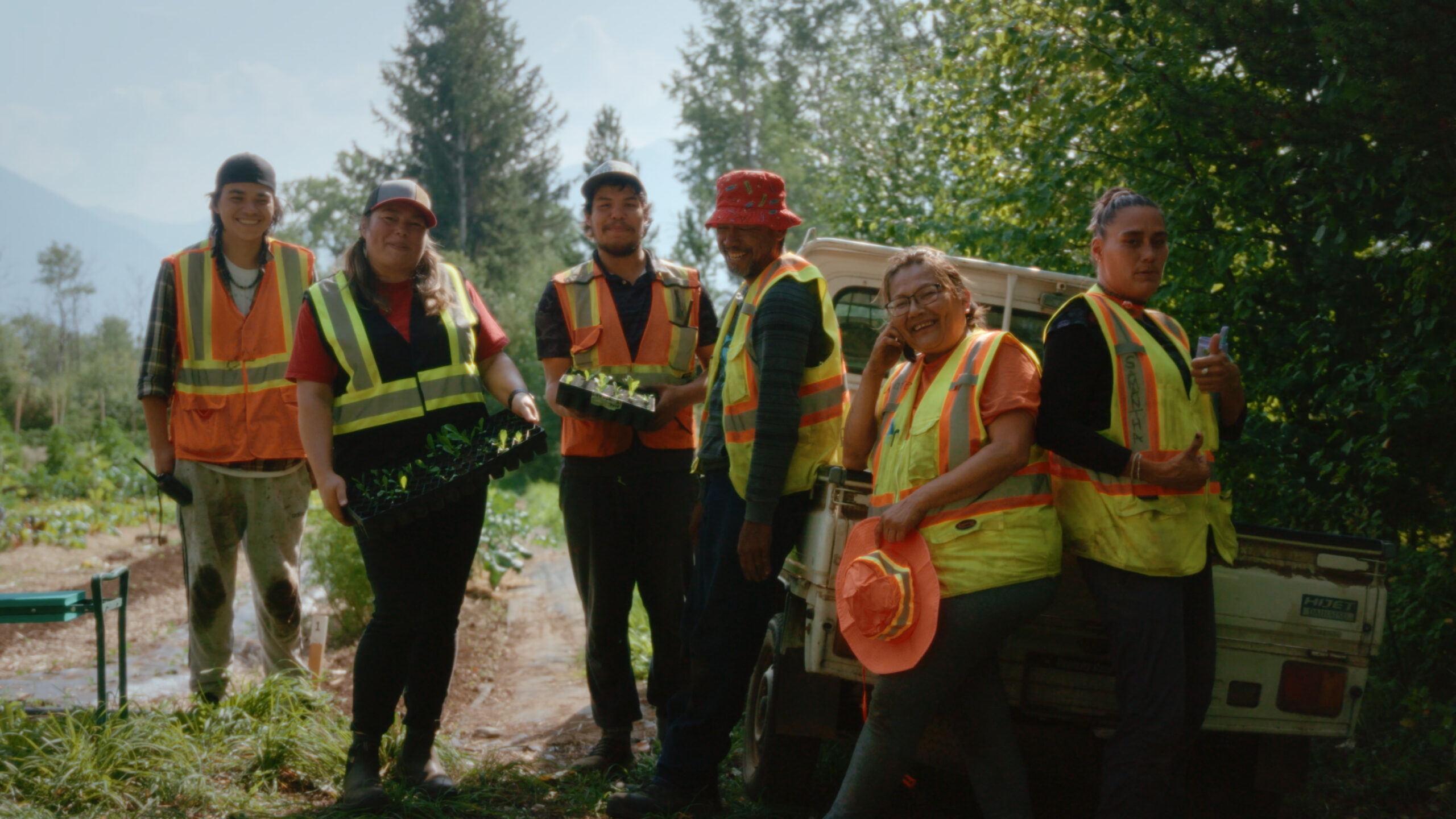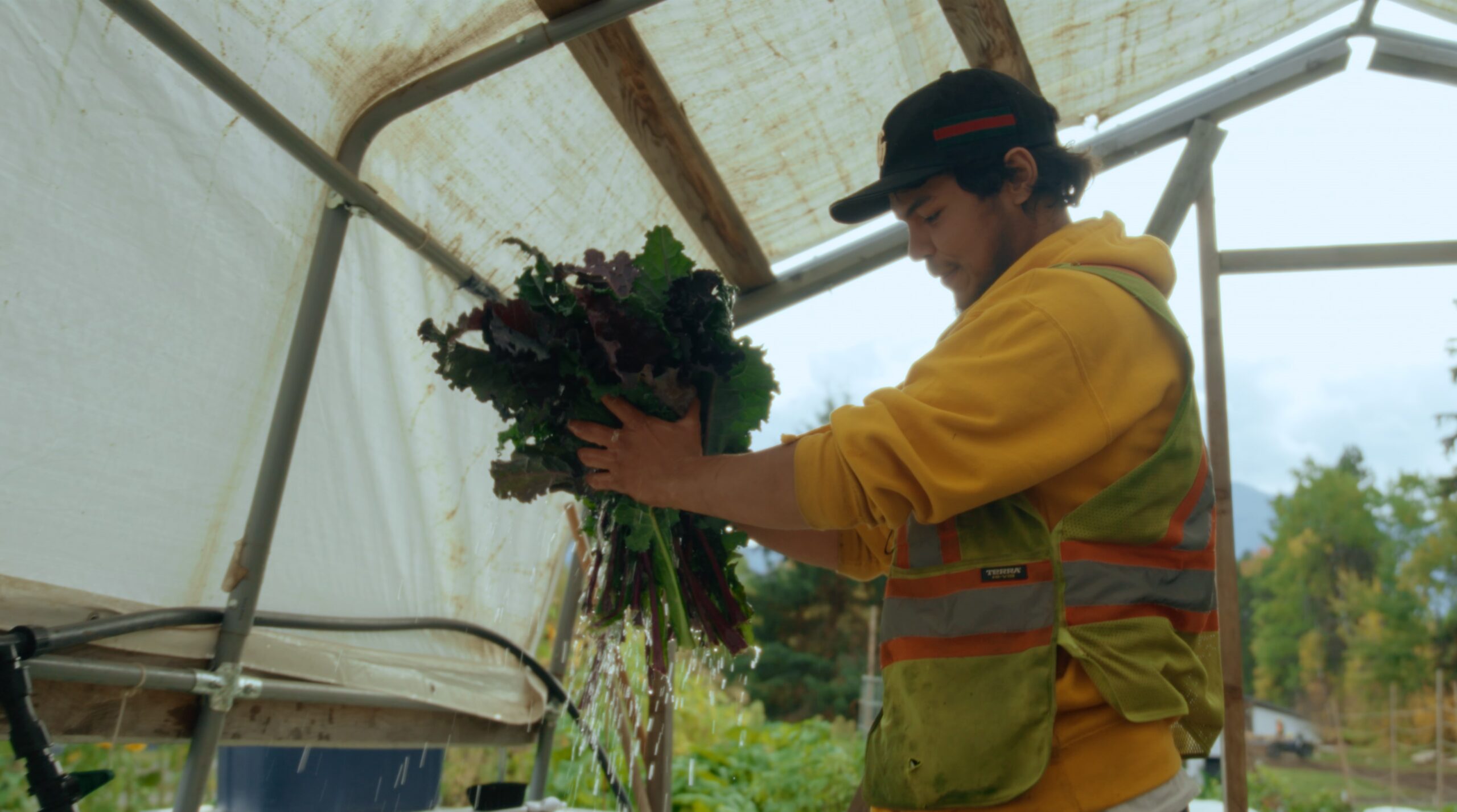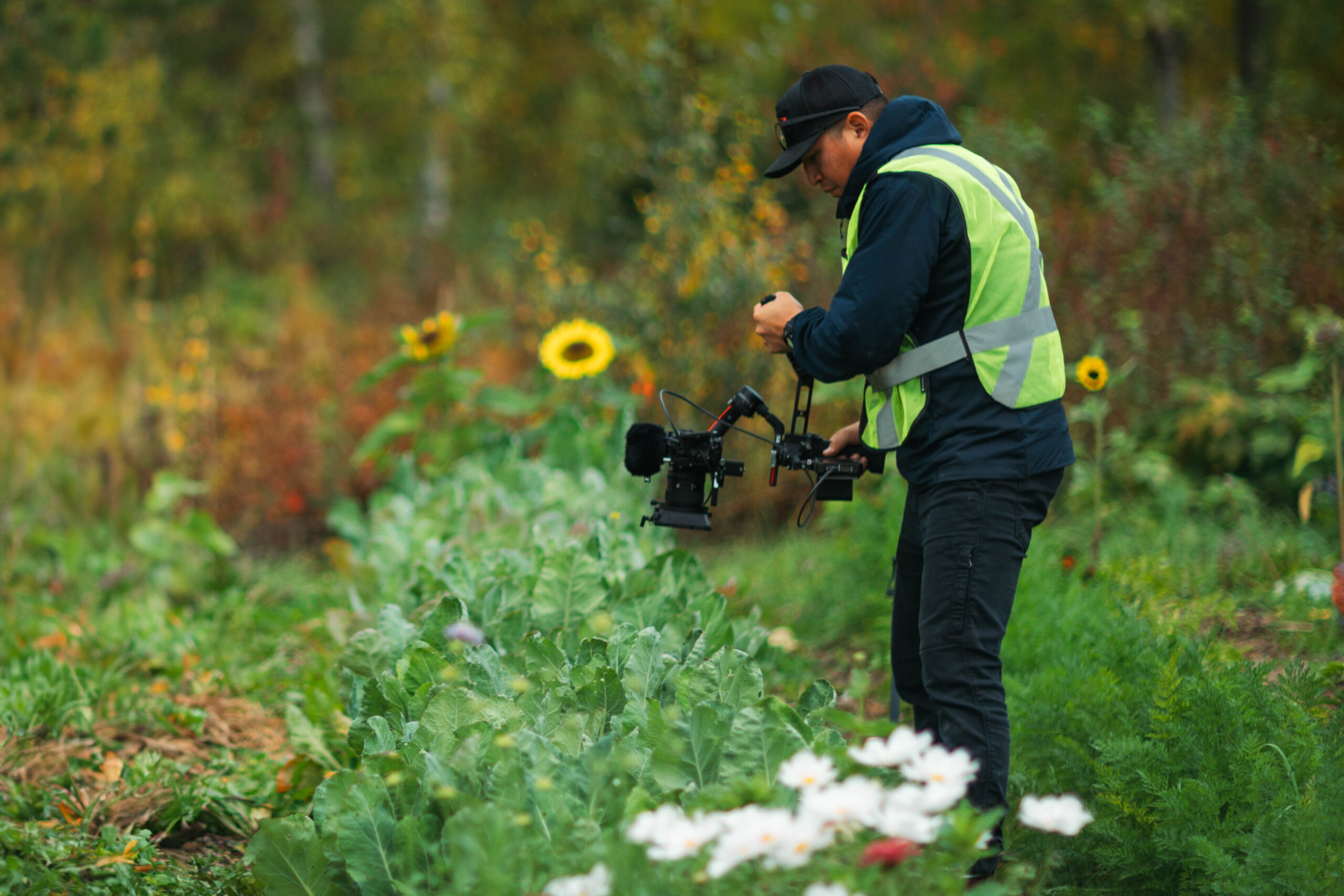
Celebrating 7 years of The Narwhal — and gearing up for the next 7
Between a fresh take on engagement and our new life on video, our team is...
Get the inside scoop on The Narwhal’s environment and climate reporting by signing up for our free newsletter.
Jacob Beaton’s name has become closely tied to food sovereignty and food security in British Columbia. His successful training program at Tea Creek Farm in Kitwanga, B.C., — a 1,200-kilometres drive north of Vancouver — has equipped hundreds of First Nations trainees in trades, food production and project management since it launched in 2021.
In 2023, 140 trainees graduated from the program. More than 60 First Nations across Canada have reached out wanting to partner with Tea Creek and learn from its holistic model, which aims to provide the tools graduates will need to pursue food sovereignty projects in their own communities — from growing seeds to carpentry to bookkeeping — all while maintaining a culturally safe space.
Beaton says the demand is so strong the program can hardly keep up. In addition to trainees, the farm hosted more than 1,000 visitors last year.
Food security is top of mind for First Nations. Tea Creek has quickly become a leader in the food security world, but despite the energy and excitement — graduates have found the program empowering — Beaton says it’s still “fragile,” like a seed that’s just taken root. The program has largely been relying on private donations.
In the documentary Tea Creek, released this month as an episode of CBC’s Absolutely Canadian, Beaton highlights how Indigenous people are showing passionate interest in the program, but it still faces difficulty scaling up.
He says the root of First Nations food insecurity is the systematic dismantling of Indigenous food systems by the Crown. The Indian Act restricted Indigenous people from hunting, fishing, farming and selling goods. They were restricted from buying land and equipment and paid less for work than settlers. As Indigenous people were pushed into poverty, keystone species — animals especially crucial to the survival of an ecosystem, like caribou and salmon — began to decline drastically. The ongoing impacts of these policies continue and Canada has done little to assist in the repair of generations of damage, Beaton says.
“I do see it as an issue of justice. Wrong was done — very clearly — and so there needs to be repair done,” he explains.
Beaton, who is Tsimshian and carries the name Dzap’l Gye’a̱win Skiik, emphasized Tea Creek isn’t looking for piecemeal grants.
“We’re just looking for fair contracts to deliver services,” he says. “Holistic services that work.”

Tea Creek’s main training contract is with SkillsTrade BC, a Crown corporation, through which it provides training and services for unemployed and underemployed Indigenous people.
He says 2024 is the first year the organization has a small federal contract, and it received a two-year grant from the B.C. Ministry of Jobs, Economic Development and Innovation in 2023 that is ending. While they did receive a grant through New Relationship Trust this year, Beaton and his team have been unable to secure any new or additional contracts or funding directly from the provincial government in the past two years.
“Not a single penny provincially this year, and not for lack of trying,” he says.
Beaton says one of the most misleading and persistent tropes about First Nations is that they were solely hunter-gatherers. In reality, he emphasizes, First Nations in what is now called B.C. have cultivated many foods at large scales for generations. They managed individual species, like clams and camas, and entire ecosystems through practices like controlled burns and selective logging.
While B.C. and Canada interfered with First Nations accessing traditional food sources, First Nations were also excluded from the new system, Beaton says. They often got taxed, fined or just simply pushed out of opportunities to prosper in the new economy, all while being confined to reserves.
When Beaton first bought 140 acres of land to start his farm off-reserve, he “didn’t realize it was an act of resistance” in the shadow of all that history, he says. Three and a half acres are actively farmed, and 50 acres are covered by a Gitxsan food forest.
Today, food insecurity is exacerbated by climate change and biodiversity loss. It’s daunting to take on an issue as mammoth as food insecurity, and it’s hard for local projects to scale up. On top of that, Beaton’s priorities include having the initiative be Indigenous led, culturally safe and inclusive. He says Tea Creek needs core or multi-year funding to support its services. The program also addresses issues that continue to impact many of their trainees’ communities: food insecurity, addiction and higher rates of suicide, all of which are linked to discrimination. Tea Creek provides access to counsellors and therapists for trainees, and served more than 11,000 free meals in 2023. Indigenous families can also receive free seeds for their home gardens.


“We’re not just a farm,” he says. “We’re a restaurant that serves free meals. We’re a taxi service that picks people up. We’re a university that provides post-secondary education. We’re a healing centre.”
At the end of day, the program’s goals come down to the personal level, helping each person who comes to the farm to bring back skills to their community.
“It’s too overwhelming for us to go, ‘Yeah, let’s go and solve even just this region’s food problems,’ ” he says. “But what we can do is we can take you [on as a trainee]. … And you’re going to be able to build a team in your nation and you’re going to be able to get going on Indigenous food sovereignty.”
Tea Creek has other funding partners including the Real Estate Foundation of BC, United Way, the Vancouver Foundation and MakeWay. In March, the BC Assembly of First Nations passed an unanimous resolution calling on the province to provide Tea Creek with additional support. Tea Creek also received accreditation from SkillsTradeBC as a horticulture training centre in 2023, making it the first designated Indigenous provider in the province.
But Beaton is still waiting to see sustained support from the provincial and federal governments.
“There’s no hand reaching out from the government side to say, ‘We want to partner, we want to be a part of this reconciliation,’ ” he says.
“My main complaint is that reconciliation is all talk, no action.”

First Nations still face barriers participating in farming and food production across the country, he says. According to Statistics Canada, there are 4,830 First Nations farmers nationwide, and 16,705 Indigenous farmers total. Beaton is willing to bet that most are “micro-scale.”
In the Tea Creek 2023 impact report, the top issues reported by visiting First Nations were “access to land, money and training.”
Beaton points out banks don’t like to loan on reserve since they can’t seize collateral, and says First Nations people can still face issues getting loans to buy land off-reserve.
“Often, policies that are embedded within institutions are a result of the old Indian Act and the old colonial policy and practice of disenfranchising First Nations people and keeping us out of the economy,” he says.
“We are not looking for any special treatment. We just want fair access to all that money that’s already there,” he says.
Agriculture and Agri-Food Canada told The Narwhal in a statement it is “working to improve access to funding and resources for Indigenous individuals and organizations” through initiatives like the Local Food Infrastructure Fund and the AgriDiversity program (which has supported Tea Creek) and through implementing the federal United Nations Declaration on the Rights of Indigenous Peoples Act.
“While we acknowledge there is still work to be done, [Agriculture and Agri-Food Canada] remains committed to ensuring that Indigenous communities have improved access to the tools and funding necessary to thrive in the agriculture sector.”
Justice Moore, a Gitxsan and Tsimshian horticulture apprentice at Tea Creek, began as a trainee. He’s from Gitwangak Village, just a few minutes up the road. Learning to care for a seed and watch it grow “helped me take care of myself,” Moore says in the documentary as he digs his hands in the soil.
“Everything up here I’m trying to bring down to the village. I want to make people down there feel the way I feel up here — comfortable, safe, secure. Up here is a constant. You’re always appreciated, you’re always valued, you’re always respected,” he said.
“We don’t have a constant in most villages. Everyone’s dealing with their own past traumas … part of that is colonialism. A lot of that is losing our Elders, because residential school taught them to keep to themselves. Their knowledge didn’t get passed down as much as it should have been, and it impacted us a lot.”

“I go out of my way to try to communicate with everybody now,” he says, smiling. “I found out recently it doesn’t matter how educated you are, where you are from in the world, what minority you are, if you can communicate healthily with everybody, you’ll become a leader because you’re working on your voice.”
In a survey for Tea Creek’s annual impact report, 86 per cent of respondents said they felt an improvement to their mental health after participating. Many First Nations communities are still facing immense struggles due to the ongoing impacts of colonization, including residential schools.
As director Ryan Dickie was working to get the film off the ground in 2021, Tk’emlúps te Secwépemc announced survey findings about unmarked graves at the former Kamloops Indian Residential School. It was a raw and emotional moment, and the history of residential schools is closely connected with the work Tea Creek is doing, Dickie said. That year the filmmaker, who is of Dene and Kwakiutl descent and a member of Fort Nelson First Nation, saw many non-Indigenous people were still not aware of the full impacts of these institutions, and the trauma and disruption in cultural knowledge they caused. What reconciliation really means was top of mind when making the documentary.

“[Tea Creek] created essentially a healing center and a place where people feel safe, a place where people feel empowered because of the skills that they’re learning. And it really harkens us back to the way things used to be in our communities,” he says.
At community screenings, he says several viewers stood up and spoke about how their people need programs like this one.
“Our people are dying, they need something to grasp onto, because we need them here. We need them to stay here.”
Dickie says he hopes Indigenous viewers feel a sense of empowerment looking at the history of food production among Indigenous people. He hopes people see the healing in people like Moore and see “what can be done when we’re given an opportunity, and what can be done when we’re given a safe space to really break free of all that trauma.”
Updated on Oct. 24, 2024, at 2:30 p.m. PT: This story has been updated to clarify the size of Tea Creek Farms, which is 140 acres. A previous version of this story incorrectly stated three acres, which refers to the area currently being farmed and not the total property.
Get the inside scoop on The Narwhal’s environment and climate reporting by signing up for our free newsletter. On a warm September evening nearly 15...
Continue reading
Between a fresh take on engagement and our new life on video, our team is...

The public has a few days left to comment on Doug Ford’s omnibus development bill....

115 billion litres, 70 years to fix, $5.5 billion in lawsuits
